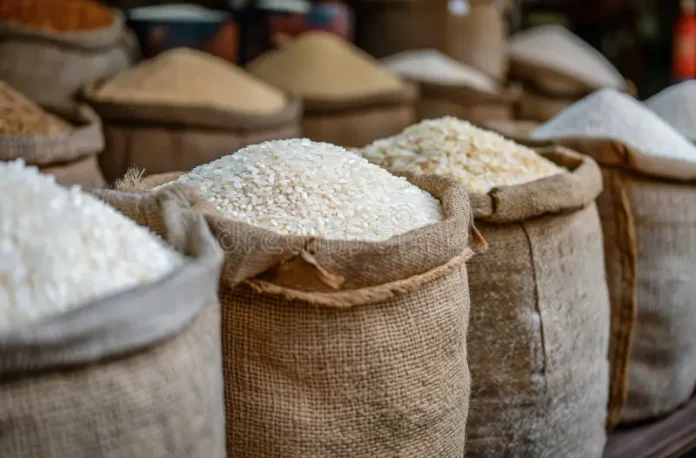Kenyans may have been exposed to yet another hazardous product after the Kenya Bureau of Standards (KEBS) flagged a two-million-kilogram rice consignment deemed unfit for human consumption.
Documents obtained from KEBS by Press revealed that the rice, imported from Pakistan between September and October, failed aflatoxin tests.
The bureau stated that the aflatoxin levels in the rice exceeded the allowable limit, making it unsafe for consumption.
According to the report, 83,000 bags of 25kg rice were transported from the Kilindini port in Mombasa to Nairobi, where they were repackaged and redistributed to various wholesale and retail outlets.
Despite the rice failing to meet safety standards, it found its way into the Kenyan market. KEBS officials, upon realizing this, launched a crackdown but managed to seize only 23,000 kilograms of the contaminated product.
Various rice grains filling burlap sacks at market stall
Market surveillance officers confiscated the flagged rice at the Central Business Park in Nairobi’s industrial area.

This incident adds to a growing list of substandard and unsafe products infiltrating the Kenyan market. Just three months ago, KEBS flagged 32 million liters of cooking oil that had illegally entered the market.
During a parliamentary session on September 23, KEBS Managing Director Esther Ngari revealed that the flagged cooking oil failed to meet the bureau’s nutritional standards but was released to the market regardless.
Ngari informed lawmakers that out of 73 containers of imported cooking oil, 43 were sold to the public. She further noted that some companies dealing in product packaging purchased the rejected oil and distributed it to retailers across the country.
“We tested several consignments, and the results showed failure. As far as KEBS is concerned, these products were rejected, and the Kenya National Trade Corporation (KNTC) should not have sold them,” Ngari told legislators.
These incidents underscore ongoing concerns about the safety of consumer products in the country and raise questions about oversight in ensuring standards compliance.







